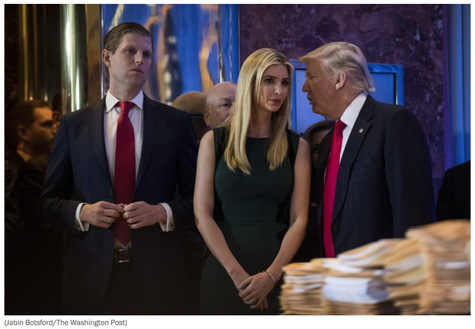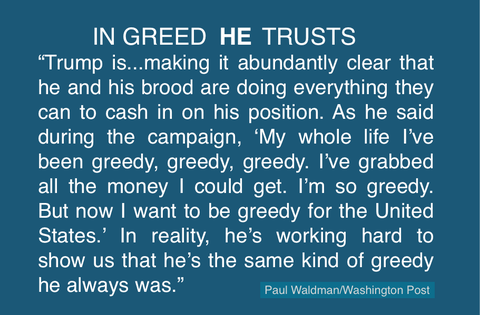|
The Plum Line Opinion
On the Trump White House’s economic agenda: Photo ops on jobs, and pitches for Ivanka’s clothing line By Paul Waldman February 9 at 1:48 PM As part of his tireless efforts to improve the American economy, President Donald Trump is currently in a battle with Nordstrom over the fact that the department store chain has decided to drop Ivanka Trump’s clothing line from its stores. “My daughter Ivanka has been treated so unfairly by @Nordstrom,” Trump tweeted Wednesday. “She is a great person — always pushing me to do the right thing! Terrible!” Unlike Trump’s targeting of individual corporations that had announced outsourcing, in this case he’s using the power of his office to attack a company for not enriching his family. Not only that, Trump’s aides have been enlisted to mount the ramparts in defense of Ivanka’s inalienable right to have her made-in-China garments sold in every store, just as the framers intended. This morning, Kellyanne Conway headed to “Fox & Friends” to offer an endorsement, claiming: “It’s a wonderful line. I own some of it. I’m going to give a free commercial here. Go buy it today, everybody.” This seemed like about as clear a violation as one could imagine of the government ethics rule which statesthat “An employee shall not use his public office for his own private gain, for the endorsement of any product, service or enterprise, or for the private gain of friends, relatives, or persons with whom the employee is affiliated…” And this came after another top Trump aide — Sean Spicer — said Wednesday that Nordstrom’s decision to drop the clothing line was a “direct attack on his policies and her name.” If you think Congress will weigh in on the Trump administration’s efforts to ensure that Ivanka maintains healthy sales, don’t hold your breath. Jason Chaffetz, chairman of the House Oversight Committee, told CNN that it’s nothing to be concerned about because “a doting father with very successful children is going to look after those children,” adding bizarrely, “I tweet a lot about cheeseburgers.” Meanwhile, the first lady is asserting in a defamation lawsuit that when the British Daily Mail reported on a false rumor that she had once worked as an escort, it deprived her of “the unique, once-in-a-lifetime opportunity … to launch a broad-based commercial brand in multiple product categories, each of which could have garnered multi-million dollar business relationships for a multi-year term during which Plaintiff is one of the most photographed women in the world.” All of this should be placed in its larger context: While so much of his attention is taken up with making sure that he and his family are adequately enriched by this once-in-a-lifetime opportunity, Trump hasn’t actually done much of anything real on the economy. There’s been no legislation signed, and just a few executive orders preparing to roll back regulations from the Obama years protecting workers and consumers. As NBC pointed out, by this time in previous presidents’ terms, they had either signed major economic legislation or were well on their way. What Trump has done instead, in addition to try to prop up Ivanka’s clothing line, is stage a bunch of events in which he took credit for micro developments he had nothing to with. For instance, on Wednesday the chief executive of Intel went to the White House so he could announce in Trump’s presence that the company will be creating 3,000 jobs at a factory in Arizona. This is the latest in a series of such events, at which clever business leaders realize they can get a bunch of free publicity and win the favor of the most powerful person in the world by letting him take credit for something they were going to do anyway. |
All this goes to a basic, enduring rule that Trump has followed for decades. He has built his career on the principle that not only is perception more important than reality, but that a vivid enough perception can actually create reality. That’s why, for instance, he has always been so sensitive about assertions that he’s not as rich as he says he is. His bottomless wealth and limitless success was the essence of the image he wanted to create, and the successful creation of that image would in turn breed more success and wealth. Anything that might undermine the image was a profound threat to the whole project.
These kinds of events with CEOs are in the same mold: create the perception that Donald Trump is transforming the economy, and then everyone will believe that the economy is doing great, and who knows, that boost of confidence just might propel the economy forward. But a look at the Intel case shows how phony it is. First, Intel actually began building that plant in 2011, but a slowdown in the PC market led them to hold off on getting it up and running until sales created sufficient demand. It was just a matter of time before they were ready; it has nothing to do with some future pro-business laws that Trump might someday sign. Second, in April, Intel announced it would be cutting 12,000 jobs from its U.S. workforce, which means the 3,000 it’s adding in Arizona don’t look like such a fantastic boost to the economy. Third, while the decision of one company to add or subtract workers means a great deal to those workers and individual communities, on the scale of an economy as vast as ours it’s essentially meaningless. So saving or creating a few thousand jobs here or there has only symbolic value when you’re considering the big picture, which is what presidents are supposed to do. But symbols can be important, and no one understands that better than Donald Trump. Our beliefs about the economy are a product of our own fortunes, what we see in our communities, and what we perceive about the nation. With these repeated photo-ops, Trump is trying to create the impression that through the force of his superhuman winningness, the entire American economy has kicked into high gear, creating jobs left and right. As a PR strategy, this approach can produce a certain amount of success. The trouble is that it’s going to be undermined by a force acting in the opposite direction: Donald Trump. The ridiculousness with Trump’s family and the corrupt ways he tries to enrich himself are never going to stop. Not only that, he won’t be able to resist lashing out at companies that displease him in other ways, like opposing his policies. You can bet that over the next four years Trump will be cheering the companies that support him and attacking the companies that don’t. He won’t be promoting American industry; he’ll be dividing the economy into the virtuous (who are good to him and his) and the sinful (who aren’t). Nordstrom’s stock didn’t suffer from Trump’s attack, but other companies that incur his wrath might find themselves losing sales — and even cutting jobs. While Trump is trying to convince you that he’s doing a great job lifting up the American economy, he’ll also be exacerbating the politicization of consumer decisions we’ve seen in recent years, and making it abundantly clear that he and his brood are doing everything they can to cash in on his position. As he said during the campaign, “My whole life I’ve been greedy, greedy, greedy. I’ve grabbed all the money I could get. I’m so greedy. But now I want to be greedy for the United States.” In reality, he’s working hard to show us that he’s the same kind of greedy he always was. The Washington Post: https://www.washingtonpost.com/blogs/plum-line/wp/2017/02/09/on-the-trump-white-houses-economic-agenda-photo-ops-on-jobs-and-pitches-for-ivankas-clothing-line/?utm_term=.02cdefabf5ff |
- REFLECTION
- MORNING WORLD
- IN CONTEXT
-
THAILAND
- THE MONARCHY >
-
NATIONAL PARKS OF THAILAND
>
- KHAO YAI NATIONAL PARK
- PHA TAEM NATIONAL PARK
- PHU WIANG NATIONAL PARK
- NAM NAO NATIONAL PARK
- PHU HIN RONG KLA NATIONAL PARK
- PHU KRADUENG NATIONAL PARK
- PHU RUEA NATIONAL PARK
- MAE YOM NATIONAL PARK
- DOI SUTHEP-PUI NATIONAL PARK
- DOI INTHANON NATIONAL PARK
- THONG PHA PHUM NATIONAL PARK
- KAENG KRACHAN NATIONAL PARK
- MU KO ANG THONG NATIONAL PARK
- MU KO SURIN NATIONAL PARK
- MU KO SIMILAN NATIONAL PARK
- HAT NOPPHARATA THARA - MU KO PHI PHI NATIONAL PARK
- MU KO LANTA NATIONAL PARK
- TARUTAO NATIONAL PARK
-
THE LIBRARY
- SUFFICIENCY ECONOMY BY KING BHUMIBOL OF THAILAND
- SOFT POWER (Joseph Nye, Jr.)
- CONVERSATIONS WITH THAKSIN by Tom Plate
- THE GREAT ILLUSION/Norman Angell
- MORNING WORLD BOOKS >
- SCIENCE >
- DEMOCRACY IN AMERICA
- FIRST DEMOCRACY
- JOHN MUIR
- MODELS OF DEMOCRACY
- MULAN
- THE VOYAGE OF THE BEAGLE
- ON THE ORIGIN OF SPECIES
- PHOOLAN DEVI
- THE REPUBLIC
- THE TRAVELS OF MARCO POLO
- UTOPIA
- A Short History of the World [H.G.Wells]
- WOMEN OF ARGENTINA
- THE EARTH : A Very Short Introduction
- THE ENGLISH GOVERNESS AT THE SIAMESE COURT
- TIMAEUAS AND CRITIAS : THE ATLANTIS DIALOGUE
- HARRY POTTER
- DEMOCRACY / HAROLD PINTER
- MAGNA CARTA
- DEMOCRACY : A Very Short Introduction
- DEMOCRACY / Anthony Arblaster]
- DEMOCRACY / H.G. Wells
- ON DEMOCRACY / Robert A. Dahl)
- STRONG DEMOCRACY
- THE CRUCIBLE
- THE ELEMENTS OF STYLE
- THE ELEMENTS OF JOURNALISM | JOURNALISM: A Very Short Introduction
- LOVE
- THE EMPEROR'S NEW CLOTHES
- THE SOUND OF MUSIC
- STRONGER TOGETHER
- ANIMAL FARM
- POLITICS AND THE ENGLISH LANGUAGE
- GEORGE ORWELL
- HENRY DAVID THOREAU >
- MAHATMA GANDHI
- THE INTERNATIONAL ATLAS OF LUNAR EXPLORATION
- พระมหาชนก
- ติโต
- นายอินทร์ผู้ปิดทองหลังพระ | A Man Called Intrepid
- แม่เล่าให้ฟัง
- SUFFICIENCY ECONOMY
- พระเจ้าอยู่หัว กับ เศรษฐกิจพอเพียง
- KING BHUMIBOL AND MICHAEL TODD
- ... คือคึกฤทธิ์
- KING BHUMIBOL ADULYADEJ: A Life's Work
- THE KING OF THAILAND IN WORLD FOCUS
- พระราชดำรัสเรื่องร่างรัฐธรรมนูญ
- TESLA INTERVIEW 1926
- IN MY OPINION
- S.ONWIMON
THAIVISION®
REFLECTION ON EVENTS ON PLANET EARTH AND BEYOND
©2023 All Rights Reserved Thai Vitas Co.,Ltd. Thailand
✉️
[email protected]
REFLECTION ON EVENTS ON PLANET EARTH AND BEYOND
©2023 All Rights Reserved Thai Vitas Co.,Ltd. Thailand
✉️
[email protected]




